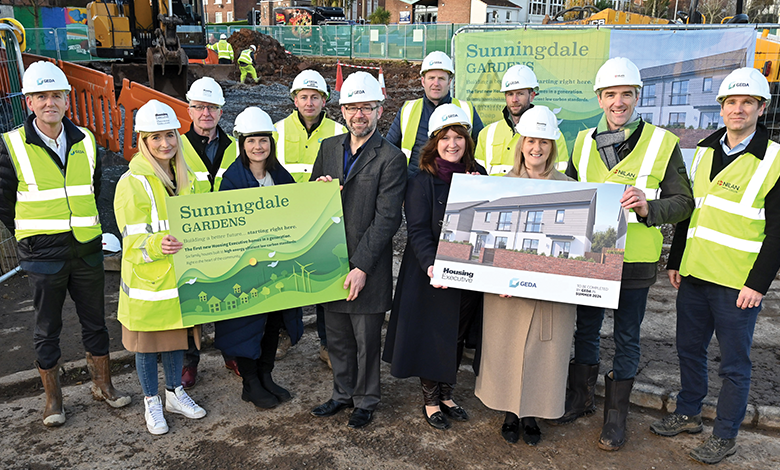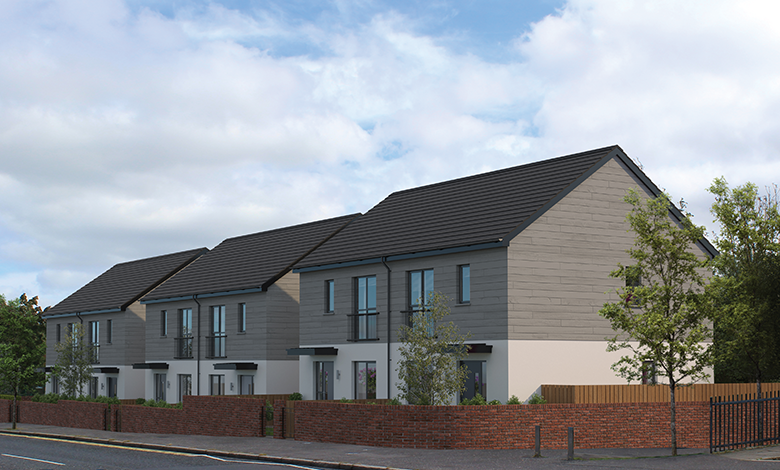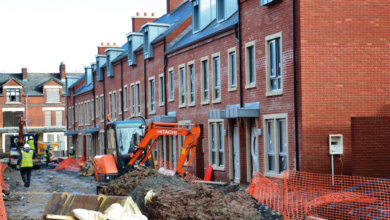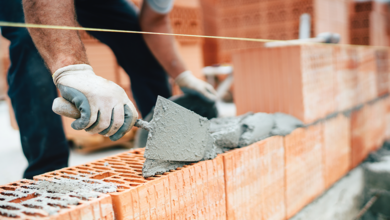Transforming our built environment for a climate-resilient future

As global temperatures continue to cause grave concern, Northern Ireland is witnessing a step-change in the delivery of decarbonised, future proofed housing. Grainia Long, Chief Executive of the Housing Executive, makes the case for purposeful, strategic intent on the path to net zero, and climate-resilient homes.
In February 2024, the European Union’s climate service confirmed our global climate breached 1.50C above pre-industrial levels for an entire year for the first time in history. Since June 2023, we have witnessed monthly record temperature breaches, with February itself clocking in at 1.770C above the norm.
According to the United Nations, levels of carbon dioxide concentrated in our atmosphere are at the highest level for at least two million years and human activity is the key factor.
The impact of climate change is being felt globally, and locally. Our tenants and our communities require us to ensure they are protected from the worst effects, but also to ensure that rapid decarbonisation becomes the norm, both in terms of how we build our homes, and how we heat them.
From strategy to action
The Housing Executive’s (NIHE) Sustainable Development Strategy is the critical document driving the pace and scale of change across the strategic housing authority, which is also the largest public landlord on these islands. The action-oriented plan is approaching its midway point, so now is a good time to reflect on how this is being delivered.
The Sustainable Development Strategy and Action Plan is grounded in the UN’s Sustainable Development Goals, and sets clear targets for greenhouse gas reduction, and commits the organisation to a singular focus on adaptation. It focuses on the key impact areas of the built environment, the biosphere, sustainable communities and transport, as well as the need for educational empowerment, and improved health and wellbeing through sustainable living.
A key pillar of the strategy is that a ‘just transition’ is essential – the energy transition must not deepen pre-existing social inequalities.
As soon as the strategy was launched, we ensured the people, time and financial resources necessary were put in place to deliver on our ambitions.
|
To date we have:
|
Our action plan will continue to drive our efforts to ensure that everyone is able to live in an affordable, sustainable and decent home, appropriate to their needs, in a safe and climate-resilient place.
A new departure for social housing
For the first time in a generation, the Housing Executive is building homes again.
As I write, a pilot project in the Sunningdale area of north Belfast is delivering six, low carbon, new-build homes to Passive House standard.
Working with construction company, GEDA, we are building future-proofed homes that will be constructed to a standard beyond that of current building regulations in Northern Ireland.
The ultra-low energy building methods being used to construct these houses will mean that our tenants benefit from improved energy efficiency and a reduction in carbon emissions, savings from reduced fuel costs and more comfortable homes.
This scheme will help us to investigate how modern methods of construction can be utilised to deliver much needed homes within a faster timeframe, to a higher level of fabric performance, and explore ways to drive down costs, in comparison with traditional construction methods.

Alongside our housing association partners, we are witnessing a step change in housing delivery, where developments at scale will provide suitable, future-proofed properties built to last beyond this century.
Retrofitting at scale
While new build is critical to ensuring decarbonised stock, the bulk of our focus must be on our existing stock.
We recently completed the Energy Efficiency in Social Housing project, funded jointly by the European Regional Development Fund (ERDF) and NIHE reserves. More than 1,400 properties across Northern Ireland benefited from works to improve the energy efficiency of their homes, assisting tenants in managing the cost of living and reducing carbon emissions from our stock. Taking a fabric first approach to non-traditional housing stock, the work included a variation of: external wall insulation; window/door replacements; cladding and roofing work; roof and floor insulation; and providing ventilation to kitchens and bathrooms, where required.
The programme enabled us to select the right method of retrofit for our particular construction type. But importantly, it also enabled us to consider procurement techniques, contract management approaches, and the skills development needed to scale up retrofit in social housing stock in Northern Ireland.
The pilot has been transformational for us as an organisation; building our capacity to ramp up retrofit across our housing stock. But most importantly, for those tenants living in newly refurbished homes, it has made a hugely positive impact on their lives.
Going beyond fabric first
While our 1,400 home retrofit programme gave us the experience we needed to understand a fabric first approach to retrofit, it is crucial that we also understand the performance effects of placing low-carbon heating systems into energy efficient homes. To understand this more fully, we have recently launched our 300 Low Carbon Energy Retrofit Programme.
This programme will see the implementation of low carbon retrofits to 300 homes by March 2025.
Phase One will include upgrades to 98 homes in the Strabane, Dunmurry, and Newtownards areas. Phase Two will include homes in Sion Mills, Dungannon, Antrim, Newtownards, and Dunmurry. This programme amounts to an investment of £9 million by the Housing Executive.
It will follow a whole house approach to reducing carbon emissions and householder bills, providing homes that promote health, through a combination of the following interventions:
- improved energy efficiency measures through retrofitting;
- low carbon heating options, principally air source heat pumps (ASHP), with options for biomethane and hybrid;
- improved ‘time of use’ electricity tariff options;
improved householder education to effect behaviour change; and - renewable energy for power generation and electric storage.
Based on our previous experience we know that retrofit programmes of this nature work best when we implement them in partnership with our tenants. To ensure our tenants get the maximum benefit from upgrades we carry out education and familiarisation visits to enhance and encourage best use of the energy efficient measures.
Putting tenants first
While a focus on our housing stock is central to reducing our carbon emissions, improving the lives of our tenants is always our ultimate goal.
As a responsible landlord we are committed to bringing our tenants along with us on the journey to net zero. With cost-of-living pressures and an increased awareness of energy efficiency we want to ensure that our tenants are supported to make changes and benefit from help on offer.
There are a number of support services available:
|
NI Energy Advice NI Energy Advice offers free independent and impartial energy advice to domestic householders in Northern Ireland, including advice about energy grants and other sources of help. Funded by the Housing Executive, the service is a one-stop shop for energy advice, providing information to help with energy efficiency grant signposting, renewable energy advice, energy saving tips, how to switch energy provider, debt assistance, fuel poverty advice signposting and how to benefit from oil-buying savings across Northern Ireland. |
|
Affordable Warmth Scheme End-to-end delivery of the Affordable Warmth Scheme transferred to the Housing Executive in September 2023. Delivered on behalf of the Department for Communities, it is designed to help those on lower incomes, and who are living in private accommodation, with the costs of energy efficiency measures. Funding for the scheme has been extended so that it will continue until March 2026. Customers may be entitled to help under the scheme if they:
Applications to the scheme can be made through the Northern Ireland Energy Advice Service. |
|
Home Energy Saving Tool Our Home Energy Saving Tool was launched in November 2023. It can help householders to lower their energy bills and make their homes more comfortable. By answering a few basic questions about their home, householders can find out how energy efficient their home is and what changes they could make for further efficiency. The tool will create an action plan to outline potential steps to improve energy efficiency. Developed in partnership with the Energy Saving Trust, the tool is available to everyone on the Housing Executive website. |
Looking ahead
The return of the Northern Ireland Executive provides an immense opportunity to launch a strategic approach to green growth, to deliver on the Northern Ireland Energy Strategy, and to ensure a robust path to decarbonisation of our residential housing stock. It provides new impetus to revise building regulations, to build partnerships with industry, to invest in research and innovation and to ensure a just transition for communities. It is a hugely optimistic time to be working in the build environment.
Much work is needed to ensure that the targets we have set are robust, and that the pathways we are choosing are realistic. Building our delivery capacity is critical which is why the NIHE has chosen to deliver a number of pilots at scale to ensure we have the funding models, procurement strategies and delivery frameworks in place before we scale up.
As government looks to the future, strategic intent is crucial to ensure that investors, industry, and consumers understand Northern Ireland’s path to decarbonisation, so that we can all work together in the best interests of our communities.
Once the right strategy and purpose is in place, organisations like the Northern Ireland Housing Executive are ready to deliver at scale.
Housing Executive
T: 03448 920 900
E: information@nihe.gov.uk
W: www.nihe.gov.uk






